Here’s every reason why you should move your eCommerce site to Magento 2.

In November 2015, Magento announced the new 2.0 platform for enterprise and community editions. The impending release of this new version sent waves through the Magento community. Some were excited for the change, while others felt Magento 1 was suitable for their ecommerce needs.
Magento 1 was officially retired in 2020 – Adobe, its owner, ceased support. That’s more than the reason to upgrade if you haven’t to! But we’ll discuss some more in-depth considerations.

What about Magento 1?
Magento was built as a flexible platform. This is really its defining feature. Users can create stores with a variety of functions using pre-made extensions or by utilizing their coding chops. This is the beauty of a platform like Magento and one reason it’s so popular.
Unfortunately, focusing on flexibility didn’t make it the most user-friendly, high-performing platform. There were important tools missing right “out of the box” that every store needed, such as performance optimization, mobile-responsiveness, and admin capabilities. In the past, users would have to go to third-party companies to get essential features.
In addition, there have been many complaints of Magento 1 running slow. In response to this, experts have determined what makes Magento sites run faster, but this still couldn’t change the issue of core speed. To address these issues, the Magento team designed an upgraded platform: Magento 2.
April 2025 Offer – For a Limited Time Only:
Get All Access Pass Package for Magento 2 for 25% off! Don’t miss out!
Benefits of Magento 2

Magento 2 comes with features that make it a better platform overall. It competes with other top platforms like Shopify and Woocommerce.
Here are some key features that contribute to this:
Improved performance
Compared to Magento 1, Magento 2 will run an average of 20% faster. Faster site speed encourages more sales and increases website search engine optimization.
Full-page caching built into the platform means pages load a lot faster, 1-2 seconds compared to the 5-10 seconds for non-caching pages. It can also better handle many catalog pages without slowing down. This makes it scalable for large stores and able to grow with an online business.
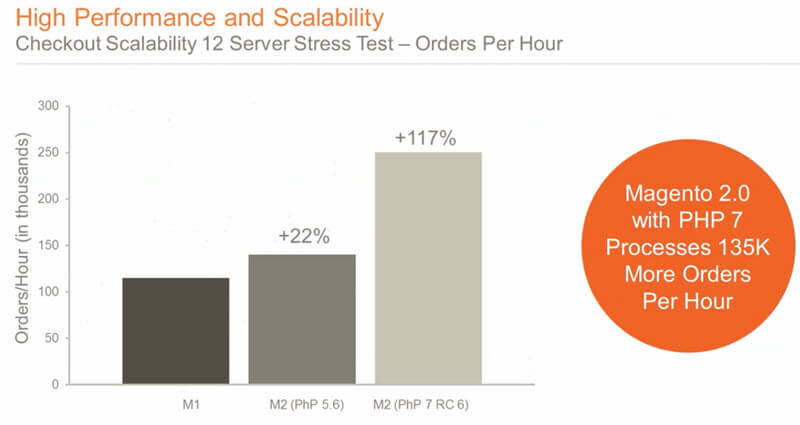
Magento 2 scalability- From Magento 2.0 GA Developer Webinar
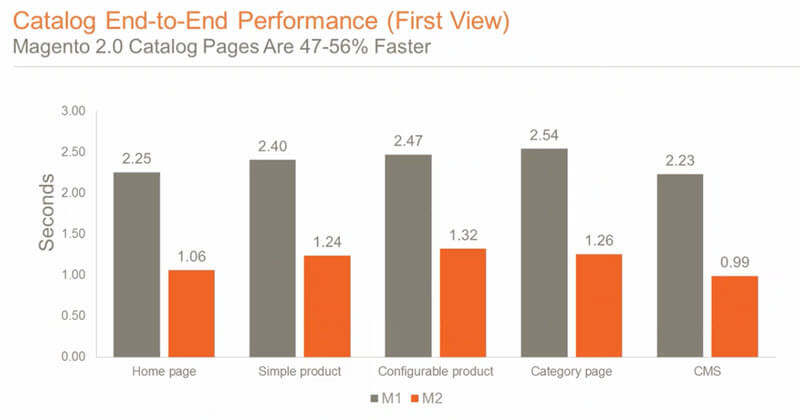
Magento 2 speed- From Magento 2.0 GA Developer Webinar
In addition, updates within Magento 2 are designed to work a lot quicker, making it easy for Magento users to take advantage of new features as they’re released.
User-friendly checkout
The checkout process in Magento 2 is more streamlined, making it quicker and easier for customers to go from cart to completed order. It’s highly customizable and requires less steps and customer information. Reducing the checkout time is huge for reducing abandoned carts and increasing conversions.
When a customer goes to checkout, they are brought to a default guest checkout screen where they enter an email address. If this matches an existing customer, they are given an option to checkout faster with saved information. Guests can create an account in one click from the order Thank You page. These features encourage repeat customers.
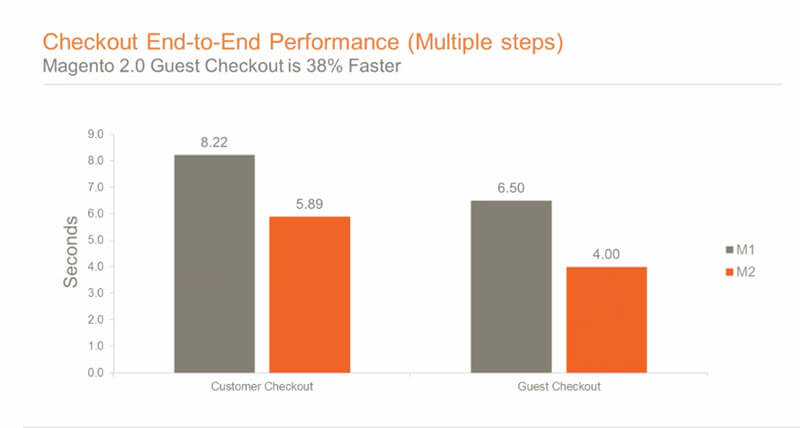
Magento 2 checkout time- From Magento 2.0 GA Developer Webinar
The majority of Magento 1 stores had to alter the checkout process in some way to make it more user-friendly. Now, better checkout options are built into Magento 2. This means every store built with Magento 2 will by default have a more intuitive checkout process.
Key integrations
Magento 2 also integrates a lot of popular extensions so stores have better functionality out of the box. This includes payment gateways like PayPal and Braintree. These are payment platforms the majority of Magento users choose to integrate anyway, so Magento 2 makes it a lot easier.

There are also integrations with Worldpay and Cybersource to increase payment security.
Better admin interface
The new admin interface is designed to help reduce the time managing an online store. It’s a lot more user-friendly and easier for new team members to learn.
Admin are able to customize the admin panel so important business information can be accessed quickly. This makes each admin panel personalized for each user to increase productivity when managing products, orders, and customer data. Creating products in the admin panel is easier than before with 4x faster product import capabilities.
The admin interface of Magento 2 now includes drag-and-drop layout editing. This means you don’t need extensive coding knowledge to modify an online store’s appearance. Create a beautiful store in half the time.
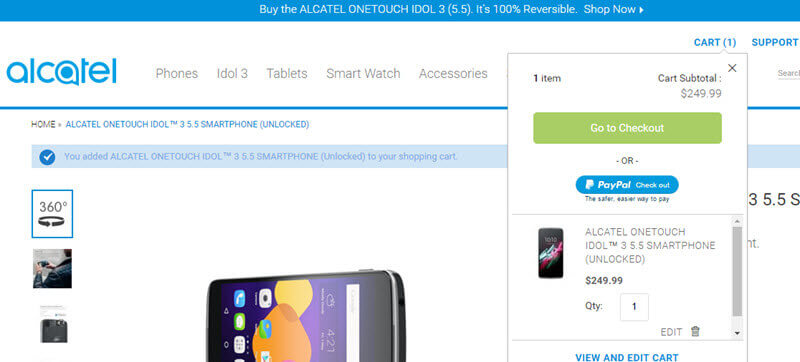
Online store running Magento 2
More mobile-friendly
Mobile responsiveness is key to improving sales, as more and more customers are shopping on smartphones and tablets. The Magento team recognized this and made mobile responsiveness a priority in the core Magento 2 platform.
It comes with new responsively designed (and SEO-friendly) themes, integrated video, and easier checkout. These all improve the look and function of Magento stores on mobile devices, thus encouraging mobile sales.
Bonus: In addition to the front-end of the site, the admin panel is touch-screen friendly so you can manage your store on the go.
But…change is hard!

It might seem like Magento 2 isn’t becoming prominent quickly. Although customers are steadily moving to Magento 2, there isn’t a huge rush of websites crossing over to the new platform.
There are several factors contributing to this:
- Magento 1 users don’t want to rebuild website
Since Magento 2 is an inherently different platform, existing website running on Magento 1 will need to be rebuilt in order to switch over. Some online store owners aren’t ready for this yet.
- They’re satisfied with the performance of Magento 1
If Magento users are completely satisfied with how the platform works for their store, they might not find a reason to migrate to Magento 2.
- Magento 2 extensions aren’t plentiful yet
Extension companies are slowly transitioning to Magento 2, so it’s possible a Magento 1 doesn’t see a Magento 2 version of their favorite extension, so are waiting to switch over.
Even though there are certainly users wary of the change, extension companies banking on a slow transition and a lot of life left in Magento 1 may be putting all their eggs in one basket.
The more others talk about the advantages of Magento 2, the more likely existing businesses will try it out as a platform. This means companies without Magento 2 extensions will likely fall behind.
Upgrading Magento 1 Extensions

Since the Magento 2 platform is so different, it requires existing extensions to be re-built. As more and more customers move to Magento 2, they will demand their favorite extensions become available. If extensions aren’t upgraded, customers will move elsewhere to find what they need.
CreativeMinds has certified Magento developers ready to help ease this transition. In addition to upgrading our own extensions to Magento 2, we’ve worked with other companies to upgrade extensions related to fraud detection, email marketing, payment gateways, and more.
Let us help give your customers the benefit of Magento 2’s new features with beautifully coded extension upgrades. This can make the transition to this new version easier and less stressful.
Conclusion
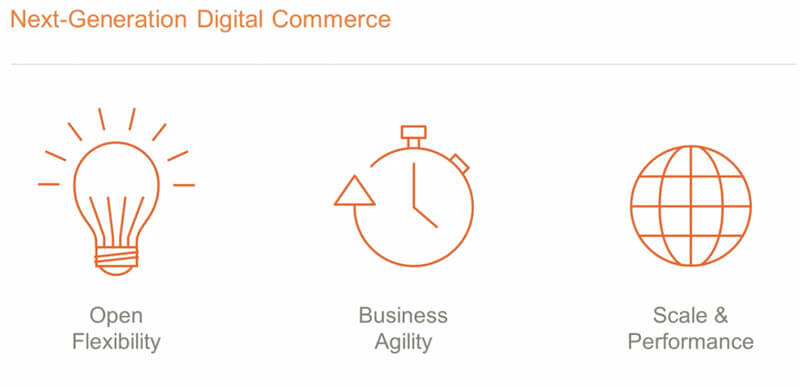
Magento 2- From Magento 2.0 GA Developer Webinar
Although some have reservations about moving to Magento 2, it’s clear this platform was designed to provide a better experience for customers and admin. It maintains the flexibility Magento is known for, but adds some important, useful features.
The new version is able to grow as businesses grow. It’s fast with a streamlined checkout process to increase conversions and encourage repeat customers.
Experts believe businesses will move to Magento 2 from either Magento 1, other ecommerce platforms, or to start brand-new online stores. To keep up, the wealth of extensions available must be upgraded to the new version.
If you need a hand, CreativeMind’s team of expert Magento developers are here to help. Contact us today to learn more.


